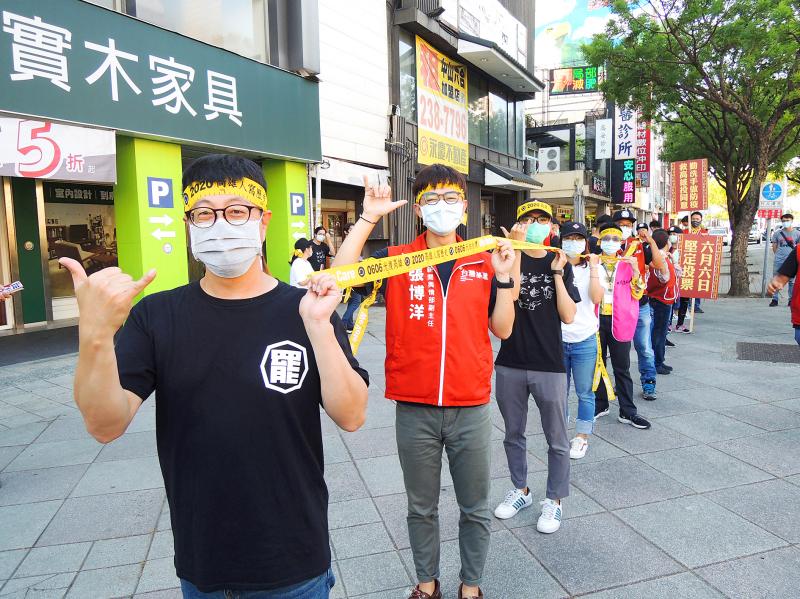The Central Election Commission (CEC) yesterday announced that nearly 90 percent of the space needed to hold a vote on whether to recall Kaohsiung Mayor Han Kuo-yu (韓國瑜) has been secured, after city agencies limited voting space.
The Kaohsiung Education Bureau and Kaohsiung Civil Affairs Bureau previously said that they would limit space in schools and temples to be used for the vote, citing COVID-19 prevention measures.
The vote is to take place on June 6.

Photo: Wang Jung-hsiang, Taipei Times
The CEC yesterday said that of the 1,823 venues it hoped to use, 1,622 have so far been secured — a total of 88.97 percent of the space needed, adding that it still needs to work out arrangements for voting stations in the city’s Sanmin (三民), Fongshan (鳳山) and Lingya (苓雅) districts.
As of yesterday, the CEC had secured 51.85 percent of the 189 venues it needs in Sanmin, 67.54 percent of the 228 venues it needs in Fongshan and 68.97 percent of the 116 venues it needs in Lingya, it said.
The city’s departments had been gradually reducing the number of venues they had agreed to provide, the CEC said, adding that they had initially agreed to provide 1,513 venues, which was reduced to 1,367 in a second report to the commission, and to 1,182 in a third report.
However, after negotiations the CEC was able to secure 1,622 of the venues needed, it said.
Meanwhile, Democratic Progressive Party (DPP) Kaohsiung City Councilor Kang Yu-cheng (康裕成) yesterday said a poll showed that Sanmin residents formed the largest group in support of recalling Han, accounting for 14 percent of the total figure citywide.
This meant the district also had the greatest need in terms of polling stations, Kang said, adding that it is still lacking 48 percent of the venues needed.
Kang and fellow DPP Kaohsiung City Councilor Ho Chuan-feng (何權峰) appealed to city government agencies to safeguard city residents’ right to vote, and implored “those with ill intent” to stay out of the voting process.
Of the venues needed in the three districts still trying to secure space, 70 percent should be schools and 14 percent should be public recreation centers, the two councilors said.
“There are still 91 places where we don’t have venues. Are you saying these places don’t even have sports fields we can use? Are there borough wardens who want to lend space, but are getting obstructed by district offices?” Ho asked.

AIR SUPPORT: The Ministry of National Defense thanked the US for the delivery, adding that it was an indicator of the White House’s commitment to the Taiwan Relations Act Deputy Minister of National Defense Po Horng-huei (柏鴻輝) and Representative to the US Alexander Yui on Friday attended a delivery ceremony for the first of Taiwan’s long-awaited 66 F-16C/D Block 70 jets at a Lockheed Martin Corp factory in Greenville, South Carolina. “We are so proud to be the global home of the F-16 and to support Taiwan’s air defense capabilities,” US Representative William Timmons wrote on X, alongside a photograph of Taiwanese and US officials at the event. The F-16C/D Block 70 jets Taiwan ordered have the same capabilities as aircraft that had been upgraded to F-16Vs. The batch of Lockheed Martin

GRIDLOCK: The National Fire Agency’s Special Search and Rescue team is on standby to travel to the countries to help out with the rescue effort A powerful earthquake rocked Myanmar and neighboring Thailand yesterday, killing at least three people in Bangkok and burying dozens when a high-rise building under construction collapsed. Footage shared on social media from Myanmar’s second-largest city showed widespread destruction, raising fears that many were trapped under the rubble or killed. The magnitude 7.7 earthquake, with an epicenter near Mandalay in Myanmar, struck at midday and was followed by a strong magnitude 6.4 aftershock. The extent of death, injury and destruction — especially in Myanmar, which is embroiled in a civil war and where information is tightly controlled at the best of times —

China's military today said it began joint army, navy and rocket force exercises around Taiwan to "serve as a stern warning and powerful deterrent against Taiwanese independence," calling President William Lai (賴清德) a "parasite." The exercises come after Lai called Beijing a "foreign hostile force" last month. More than 10 Chinese military ships approached close to Taiwan's 24 nautical mile (44.4km) contiguous zone this morning and Taiwan sent its own warships to respond, two senior Taiwanese officials said. Taiwan has not yet detected any live fire by the Chinese military so far, one of the officials said. The drills took place after US Secretary

THUGGISH BEHAVIOR: Encouraging people to report independence supporters is another intimidation tactic that threatens cross-strait peace, the state department said China setting up an online system for reporting “Taiwanese independence” advocates is an “irresponsible and reprehensible” act, a US government spokesperson said on Friday. “China’s call for private individuals to report on alleged ‘persecution or suppression’ by supposed ‘Taiwan independence henchmen and accomplices’ is irresponsible and reprehensible,” an unnamed US Department of State spokesperson told the Central News Agency in an e-mail. The move is part of Beijing’s “intimidation campaign” against Taiwan and its supporters, and is “threatening free speech around the world, destabilizing the Indo-Pacific region, and deliberately eroding the cross-strait status quo,” the spokesperson said. The Chinese Communist Party’s “threats